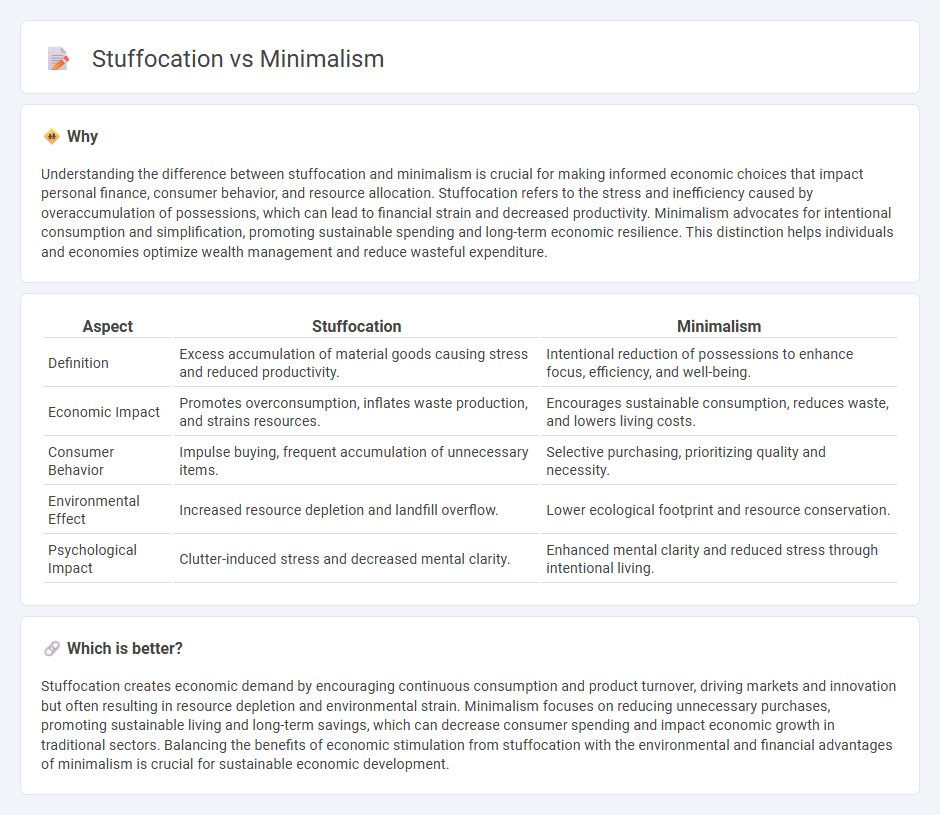
Stuffocation describes the economic and psychological strain caused by excessive consumerism and clutter, leading to decreased productivity and well-being. Minimalism emphasizes reducing possessions to focus on meaningful experiences and financial efficiency, promoting sustainable economic habits. Explore how these contrasting lifestyles impact modern economic trends and personal finance strategies.
Why it is important
Understanding the difference between stuffocation and minimalism is crucial for making informed economic choices that impact personal finance, consumer behavior, and resource allocation. Stuffocation refers to the stress and inefficiency caused by overaccumulation of possessions, which can lead to financial strain and decreased productivity. Minimalism advocates for intentional consumption and simplification, promoting sustainable spending and long-term economic resilience. This distinction helps individuals and economies optimize wealth management and reduce wasteful expenditure.
Comparison Table
| Aspect | Stuffocation | Minimalism |
|---|---|---|
| Definition | Excess accumulation of material goods causing stress and reduced productivity. | Intentional reduction of possessions to enhance focus, efficiency, and well-being. |
| Economic Impact | Promotes overconsumption, inflates waste production, and strains resources. | Encourages sustainable consumption, reduces waste, and lowers living costs. |
| Consumer Behavior | Impulse buying, frequent accumulation of unnecessary items. | Selective purchasing, prioritizing quality and necessity. |
| Environmental Effect | Increased resource depletion and landfill overflow. | Lower ecological footprint and resource conservation. |
| Psychological Impact | Clutter-induced stress and decreased mental clarity. | Enhanced mental clarity and reduced stress through intentional living. |
Which is better?
Stuffocation creates economic demand by encouraging continuous consumption and product turnover, driving markets and innovation but often resulting in resource depletion and environmental strain. Minimalism focuses on reducing unnecessary purchases, promoting sustainable living and long-term savings, which can decrease consumer spending and impact economic growth in traditional sectors. Balancing the benefits of economic stimulation from stuffocation with the environmental and financial advantages of minimalism is crucial for sustainable economic development.
Connection
Stuffocation, the overwhelming accumulation of material possessions, contrasts with minimalism's focus on intentional living and decluttering, driving consumer behavior changes in the economy. This shift reduces demand for non-essential goods, influencing market trends and encouraging sustainable consumption patterns that promote resource efficiency. Businesses adapt by offering minimalist products and services, reshaping economic models towards sustainability and mindful spending.
Key Terms
Consumerism
Minimalism emphasizes intentional living by reducing unnecessary possessions to combat the overwhelming clutter caused by consumerism, promoting mental clarity and sustainable habits. Stuffocation, a term coined to describe the psychological suffocation experienced from excessive material belongings, highlights the negative impact of unchecked consumerism on personal well-being and environmental health. Explore deeper insights on how minimalism can counter consumerism's effects and foster a balanced lifestyle.
Sustainable Consumption
Minimalism emphasizes intentional living with fewer possessions to reduce environmental impact, while stuffocation highlights the overwhelming stress caused by excessive material accumulation. Both concepts advocate for sustainable consumption by promoting mindful purchasing habits and reducing waste to preserve natural resources. Explore how adopting minimalism can combat stuffocation and drive eco-friendly lifestyle choices.
Value-Based Spending
Minimalism emphasizes intentional living by prioritizing meaningful possessions and experiences to reduce clutter and enhance well-being, while stuffocation describes the stress and dissatisfaction caused by overconsumption and excessive material belongings. Value-based spending guides individuals to allocate resources toward items and activities that align with personal values, promoting financial mindfulness and greater satisfaction. Discover how embracing value-based spending can transform your relationship with possessions and improve overall quality of life.
Source and External Links
Minimalism - Minimalism is an art movement and lifestyle focused on using only what is essential, reducing excess, and embracing simplicity in daily life and surroundings.
What Is Minimalism? - Minimalism means intentionally valuing what matters most and removing distractions, bringing freedom from consumerism and the chaos of modern life.
The Minimalists - Minimalism - Minimalism is a practical tool for eliminating life's excess to focus on what is truly important, enabling happiness, fulfillment, and personal freedom.
 dowidth.com
dowidth.com